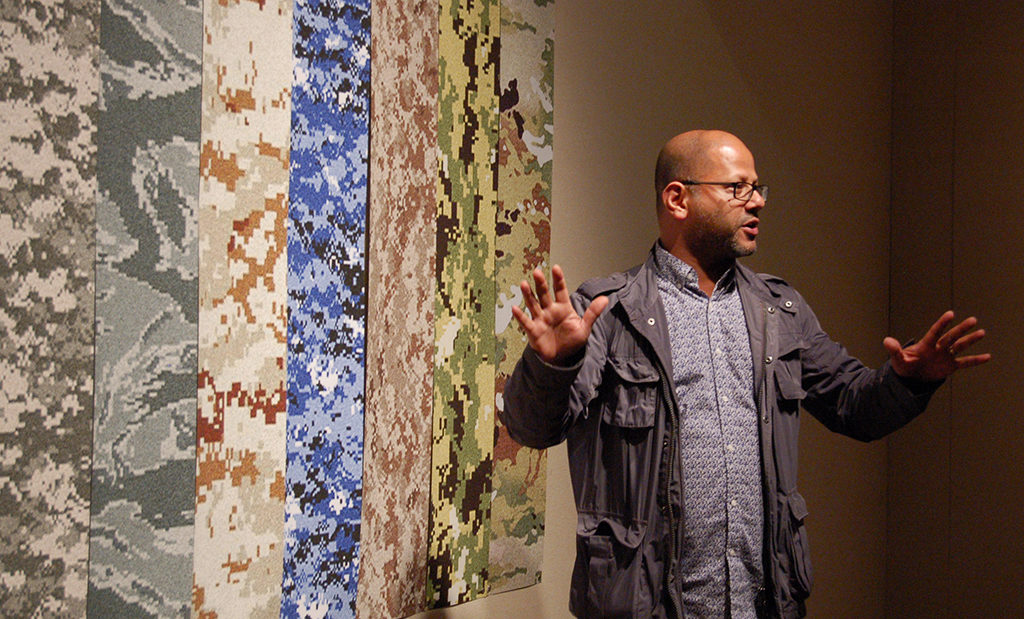
About 77 people walked through the dimly lit rooms of the Juanita Harvey Art Gallery at 7 p.m. on Oct. 20 at the opening reception for the exhibit by Hasan Elahi, conceptual artist. Each photo hung up was the product of a decade long project by Elahi, which centers around government surveillance and the importance of privacy.
Elahi, a professor of art at the University of Maryland, is a speaker and media artist. Born in Rangpur, Bangladesh and raised in the United States, Elahi was detained at an airport in Detroit in 2002 and the FBI questioned his whereabouts for months. During this time, he began cataloging his daily whereabouts with photos that he would send to the FBI. Over the course of several years, his website accumulated thousands of photos, which eventually became crafted into exhibits shown worldwide.
“I’m not even sure that this is an art project at all. This might be something like how an artist reacts to a specific condition. But that, in itself, is art because art is always reflecting society is around it,” Elahi said.
Elahi said when he was detained, survival was the first thing going through his mind.
“What happens at that moment, when you’re sitting across from a table with someone who has the power of life and death over you, you revert to this animalistic sense of survival. And in my case, survival meant cooperation,” Elahi said.
At the reception, Elahi addressed the gathering and took viewers through the process behind each piece. The artwork included the photos from his website, the progressing of patterns of camouflage used by the military over time and an aerial photo of the campus from the ‘50s.
“I’m interested in archives, in collecting information. So, it’s a personal archive of all my information over the years,” Elahi said in his speech, “All of us are generating so much media, so much information.”
He also spoke about how modern technology affects privacy in our daily lives.
“All of you have two cameras, one on the front of your phone, one on the back. At any given moment, in any given space, it doesn’t matter how public you are or how private you are, there are at least twice at many cameras as people,” Elahi said.
Carlos Aleman, exhibit organizer, said although he had some previous knowledge of Elahi’s work and the concept behind it, he was always interested in non-traditional art exhibits.
“One of the best parts of art exhibitions that aren’t traditional is that you have to ask the question ‘what’s this about?’ and getting through an artist’s statement,” Aleman said.
Catherine Prose, professor of art, discussed what she liked about Elahi’s exhibition and why artists like him are important for students to see.
“I like how it changes the space. I like that it’s not the same and shows our students that you can break out of the frame,” Prose said.
Juan Parra, graphic design sophomore, echoed Prose’s statements.
“It’s different. It’s something I’ve never seen before. It’s kind of all new but in a way it’s refreshing because it’s a unique new experience to witness. It’s refreshing to see new kinds of art being introduced,” Parra said.
Marissa Daley, art junior, said she was impressed with the concept of the exhibit.
“It’s fantastic. He was talking about how he took pictures of his life so the FBI didn’t have anything about him and couldn’t use anything against him. Taking that and turning it into an art exhibit is just amazing,” Daley said.
Robert Mackey, art freshman, said the exhibit is a perfect representation of the debate about too much government surveillance versus too little.
“It’s for security, but at the same time, who knows what they are going to do with the information,” Mackey said.
Melissa Koss, humanities junior, said she falls in the middle when it comes to this debate.
“His storyline is how no one really has privacy goes with [the exhibit] really well so I think that that’s interesting. I fall in the middle of the argument. If you really have nothing to hide, it doesn’t matter, but at the same time, I want my privacy,” Koss said.
Don Bridgberg, Wichita Falls resident, said even though there is a risk when it comes to government surveillance, he understands that there is a need for it.
“We live in a much more surveilled world that were in the past because you never thought about what you were doing or cameras put somewhere but now you expect that anything you do is going to be watched by someone or something somewhere, so you kind of have to live that way,” Bridgberg said. “There’s a need for surveillance.”
















